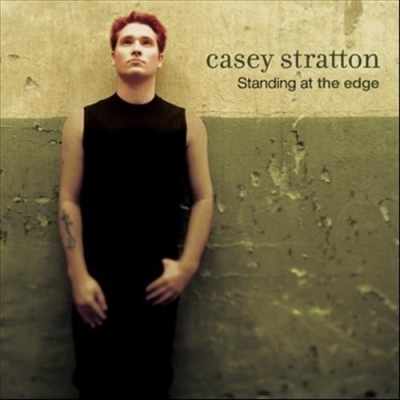
Standing at the Edge
by Aaron LathamIt is evident by the opening vocals on Casey Stratton's debut Standing at the Edge that this classically-trained musician possesses a unique instrument. The yearning high tone of his voice distinguishes him from other singer/songwriters and at times sounds vaguely feminine, especially when he reaches skyward towards his impressive falsetto. "Macho" is not a word that describes Stratton's voice or his music, but that should hardly matter, as Standing at the Edge has much to offer anyone whose musical tastes run along the lines of Sarah McLachlan or Duncan Sheik. Stratton's introspective lyrics paint four-minute song portraits that are colored with a searching fragility in which his life experiences can be viewed and pondered. However, it is a bleak picture, as most of the songs deal with failed relationships, mostly attributed to insecurity. Lines like "if I had been more confident in myself" or "I am so afraid" appear throughout the disc in various forms. Everyone faces similar feelings at times, but with all of the self-flagellation discussed it is remarkable that Stratton has made it this far in the music business. The accompanying music reflects a similar tone as his plaintive piano leads the way through the mainly mid-tempo tracks that have been flawlessly produced by Patrick Leonard (Madonna, Elton John). By tapping directly into Stratton's psyche, Leonard has created a meditative atmosphere in which to host these confessionals and has built a steady base for Stratton's vulnerable voice to stand upon. When combined with his penchant for hooky pop melodies, songs like "For Reasons Unknown" and "House of Jupiter" provide shimmering moments that demand attention and radio airplay. "Blood" percolates with an alt rock feel that resembles a mellow Linkin Park track, while the sparse "Dead Sea" beautifully caps off the excellent first-half of the disc. However, the longer the disc goes, the less interesting Stratton's mini-therapy sessions are, as both the music and lyrics become tedious, and his vocal work starts to lose its allure. There is strength underneath that angelic voice and he should utilize that power with confidence rather than always sounding like he's on the brink of tears. Despite these few minor quibbles, Standing at the Edge is a solid debut and should bring widespread recognition to this talented artist. Hopefully, this success will bring about some good experiences for Casey Stratton, and the malaise that coats his songs will melt away to reveal a brighter and more confident artist.
